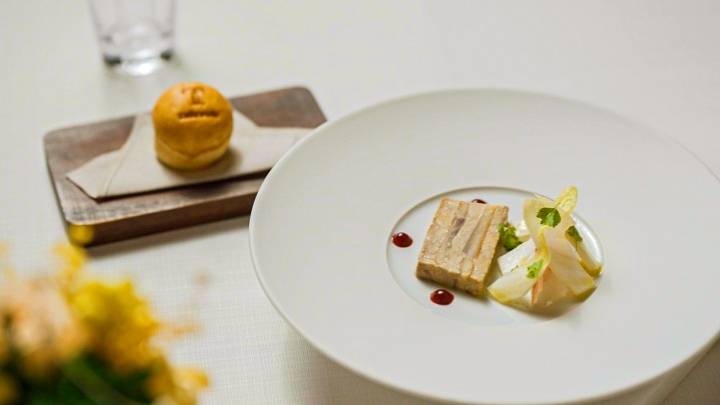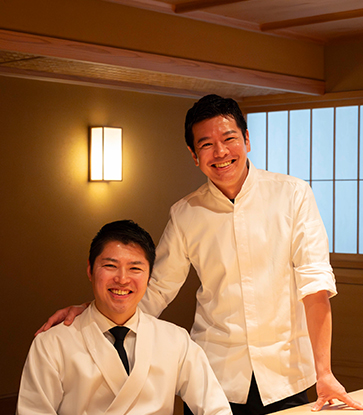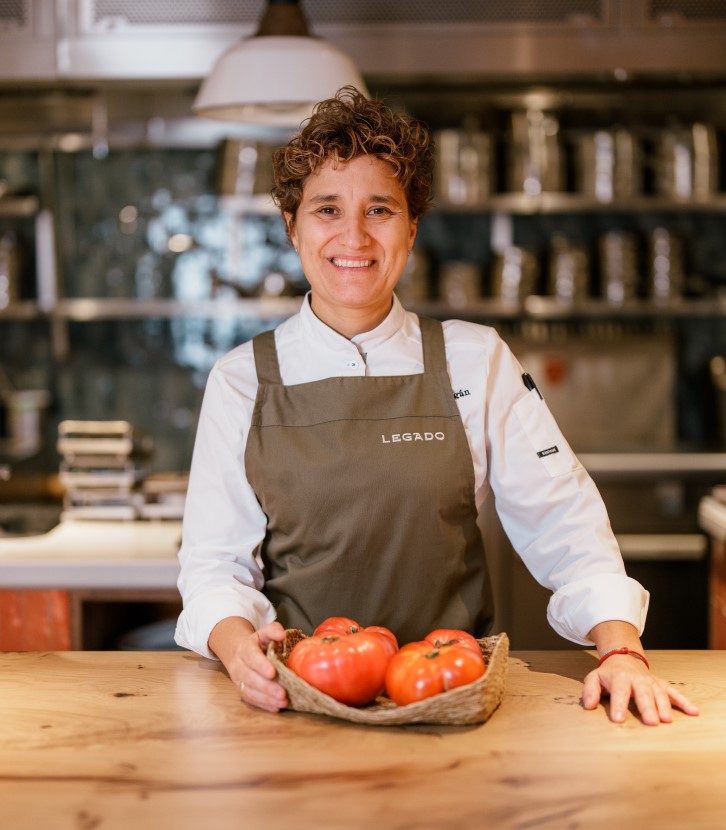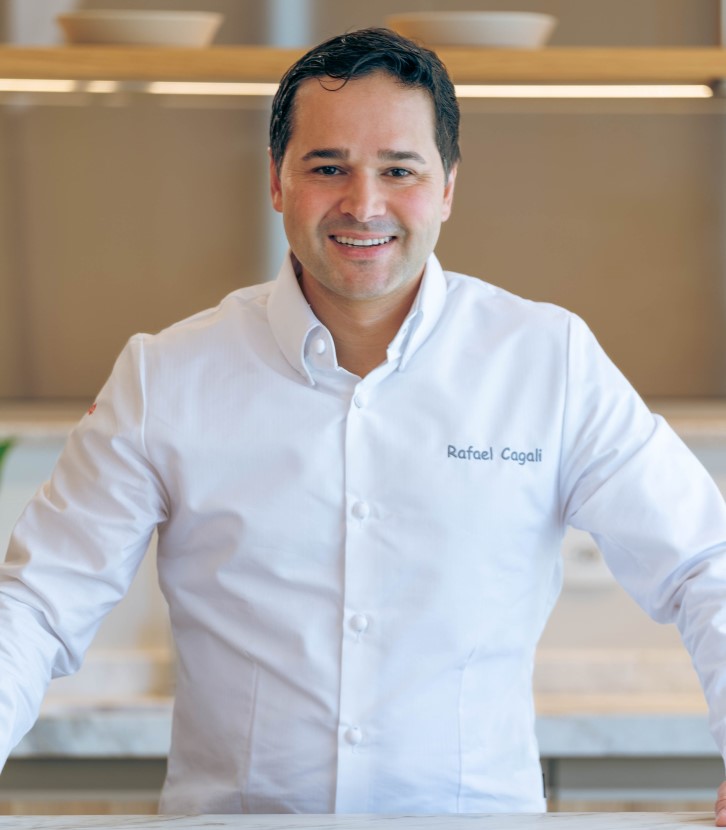"I was really happy when I was promoted from one MICHELIN Star to two MICHELIN Stars. But when I was promoted from two MICHELIN Stars to three MICHELIN Stars, it was then that I felt they truly understood my style and were willing to believe in me and support me so that I could take another step forward," shared Taïrroir's chef de cuisine, Kai Ho, in an interview a week after the MICHELIN Guide Taiwan 2023 was launched. For seven years, the chef put aside the noise and detractors to plow his way forward with the restaurant. And now, to suddenly look back and find that he always had supporters silently rooting for him, was a moving moment. “I was more than happy; I was moved to know that people got what I was doing.”
Winning the three-MICHELIN-Star accolade makes Taïrroir the first restaurant in the world to receive the highest recognition from MICHELIN for Taiwanese cuisine. "My mental and emotional states, and also my figure, have had their ups and downs, but the passion in my heart has never changed,” he said emotionally on stage as he received the award.
An Expression of Ho’s Taiwan
Born in Taichung, Ho began his culinary career on the foundation of Chinese cuisine. His work then took him to the United States and China to train teams for store openings for the large restaurant group he was working with at that time. Later, he also found himself in Singapore working at acclaimed French restaurant Guy Savoy’s overseas outpost before taking up the head chef position at JAAN (now JAAN by Kirk Westaway, a two-MICHELIN-Starred restaurant) under Julien Royer, now the proprietor of three-MICHELIN-Starred Odette.
Returning to Taiwan after many years abroad, Kai Ho founded Taïrroir as an expression of his own culinary journey, and as a fresh perspective on Taiwanese culture.

Here, the chef brings his feelings for his motherland to life on a plate; each dish an elaborate love letter full of rich emotions and unique expressions that reflect himself as a person as well. A dish of Poisson du Jour, Yam Leaves, Vanilla Béchamel Sauce "Braised", and Arugula Chive combines crimson sea bream, a local favorite, with homemade salted lard marinated with garlic, rice wine, black pepper, licorice powder, and five-spice powder. It is then pan-fried until it turns a delicious golden brown. The fish is served with a traditional red braising sauce that pairs surprisingly well with a French béchamel tinged with vanilla.
The dish was inspired during his two weeks as a guest chef at two-MICHELIN-starred Ikarus in Salzburg when the Taiwanese classic that flashed in front of his eyes was not braised pork rice nor beef noodles, but the humble red braised fish. Upon his return, he developed this contemporary interpretation of that dish to capture his nostalgia for the time spent in Austria.

Another dish of Foie Gras, Smoked Milkfish, Red Plum Pear, and Galangal also demonstrates his adeptness with Taiwanese, Chinese, and French cuisines. He layers foie gras and milkfish, a familiar Taiwanese ingredient, into a frozen terrine that looks like a classic French dish but tastes distinctly Chinese, with flavors of burnt caramel, black tea, and sesame paste. This is then paired with a sauce made from red plum pear and pickled galangal; and a salad of pears soaked in red plum juice and chicory.
This dish is an elevated interpretation of a popular Taiwanese street food snack of smoked shark meat, and is also a tribute to three-MICHELIN-Starred Spanish restaurant Martín Berasategui’s signature smoked eel dish that has been on the menu since its inception in 1993.

Taïrroir’s signature dish, Pu’er Organic Egg, Sweet Potato Fondant, Pain Dentelle, and “Congee”, is a riff on another Taiwanese street snack. Featuring a Pu’er tea-infused egg with runny yolk accompanied by a myriad of ingredients like dried radish, melon, crispy tuile, chicken porridge, fermented red yeast rice, and edamame purée, the dish captures the chef’s childhood memories of comforting porridge and eating tea eggs at highway rest stops.


A Personal Cuisine
While running a restaurant is never a one-man show, in many ways, Taïrroir is a complete reflection of Ho. His fingerprints can be found on every aspect of the restaurant, from the style of service and guest relations to the floral arrangements and selection of dinnerware. Of course, the restaurant is not a one-person team, but in many ways, Taïrroir almost represents Ho.
(Photo: Taïrroir)

The chef’s high standards are well known. "One of the things that the chef has said that’s left the greatest impression on me is to be fastidious and never make do,” says Dennis Huang, a commis chef that has been with Ho for the last two years. He shares how the chef always demands perfection and would never settle for 60 or 70% effort. In fact, the very morning of this interview, the kitchen had already gone through five versions of a simple steamed pork dish to improve it.
Ho admits having his fair share of detractors along the way, with some saying that he overlooked the essence of simple delicious food in the pursuit of creativity; others mocking the notion of paying thousands to eat porridge or other street food dishes. Yet, others complained about the décor or service, making fun of the Chinese dish names that played on homophones, and the fact that the restaurant played Chinese and Taiwanese songs. But to him, every detail of the restaurant is actually a unique, personal expression; intentional and carefully designed. Even the music is personally selected by the chef and his team to present another perspective of Taiwan.

“We’ve broken through to another dimension of Taiwanese cuisine, one that isn’t so clearly defined yet. But people thought that we had lost our way,” says Ho. The past seven years left him with the sense that no one understood his vision. Meanwhile, as the world tried to understand and define his culinary style, Ho resisted being pigeonholed as Taiwanese-French fusion because he believed what he produced in the kitchen was the outward expression of his mind, including his worldview, his unique experiences, acquired skills, flavor vocabulary, and cultural exposure.
He prefers to say that his food is his and represents him as a person.
Coming into His Own
A light was shone into the darkness when Taïrroir was awarded one MICHELIN Star in 2018. "Suddenly, I felt like I didn’t have to fight so hard to prove myself anymore. It’s not like getting a MICHELIN Star is the be all and end all, but it was like an affirmation after many years of doubt that someone understands you.”

At the same time, the way he thought about how the world viewed him also changed.
The successive deaths of two high school friends had a great impact on him. He came to understand that the world was full of chaos, and that he only had to focus on being himself and let go of all the things he could not control.
His standards are still high but his methods of upholding them have become softer over the years. Where he would be very strict with himself and others in the past — post-pandemic, he’s begun to prioritize the long-term sustainability of the restaurant and his team’s work-life balance.

His employees all know that he is actually a sensitive and affectionate person, and the way he behaves is unique, just like his dishes. Marketing manager Vanessa Cheng shares how, even after working six years at Taïrroir, Ho would never praise her directly, but instead would personally prepare noodles with scallion oil or beef noodles from scratch for their staff meals or go out of his way to protect his staff when they are faced with rude customers.
His food has also started to reflect the changes in his attitude. In the past, every dish was meticulously worked on to express a deliberate message, but in recent times, he has broken away from this — the details and layers are still there, but the stories are now told in a simpler way. "I used to work very hard, but now, I just cook what I like to eat and put my heart in there so that the customers can feel it," he says.
Although the road has not been easy, Ho says he still enjoys the ride. He derives a great sense of fulfillment and satisfaction in the act of cooking, and the joy of connecting with like-minded food lovers. It is through his cooking that one can taste the love for what he does.
"As long as one person among a thousand understands you, it's worth it,” he says emphatically.





















